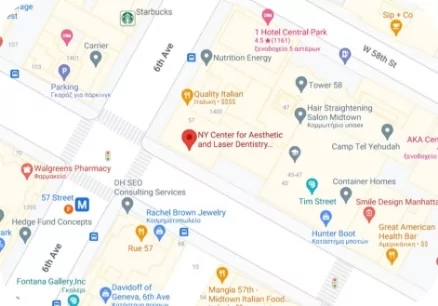
Is jaw pain making your daily activities a challenge? Tired of the constant clicking and popping in your jaw? Temporomandibular Joint Dysfunction (TMJ), also known as TMD, might be the answer to your struggles.
Temporomandibular joint dysfunction (TMD) encompasses a range of conditions affecting the jaw joint and muscles, causing symptoms like jaw pain and limited movement, impacting daily life. Seeking treatment is crucial to alleviate discomfort and enhance well-being.
Luckily for you, our team of professionals at the NY Center for Aesthetic and Laser Dentistry in Manhattan offers specialized TMD solutions! At an expert consultation with Dr. Poiman, we’ll utilize advanced techniques to diagnose and create personalized treatment plans for your TMJ pain. We’ll do all we can to ensure effective relief and improved oral health. Call us today to schedule your consultation and learn more!
What Is TMJ?
The temporomandibular joint (TMJ), which is the connection point between the jawbone and the skull. This joint is responsible for the movement of the jaw, allowing us to talk, chew, and yawn.
Temporomandibular joint dysfunction, encompasses a range of conditions affecting the the TMJ and surrounding muscles. This dysfunction causes TMJ symptoms like jaw pain, difficulty in movement, and impacts daily life significantly. Seeking TMJ treatments is crucial to alleviate discomfort and enhance well-being.
TMD can be caused by various factors including:- Injury to the jaw
- Arthritis
- Clenching or grinding of the teeth
- Misalignment of the teeth or jaw
TMD can be a temporary or long-lasting issue. It can affect one or both sides of the face and is more common in women than men. Understanding TMD and seeking appropriate treatment is essential for managing symptoms and improving quality of life.
What Are the Signs and Symptoms of TMJ and TMD?
Because of your jaw’s importance in daily tasks, TMJ problems can have widespread effects throughout your body. Some of the most common symptoms include:
- Pain and Discomfort | One of the most common symptoms of TMD is pain or tenderness in the jaw, especially when chewing or speaking. This pain can also extend to the ear, face, and neck.
- Limited Movement and Locking | People with TMD may experience difficulty opening or closing their mouths. In some cases, the jaw may lock in an open or closed position.
- Sounds in Your Jaw | Clicking, popping, or grating sounds in the jaw joint when opening or closing the mouth are common in TMD. These sounds may or may not be accompanied by pain.
- Tinnitus or Ringing in the Ears | Another symptom that may be associated with TMJ disorders is tinnitus, or ringing in the ears. While it might seem unrelated, the muscles and ligaments connected to the TMJ are also connected to parts of the ear, and dysfunction in the joint can impact hearing sensations.
Other TMJ symptoms include swelling on the side of the face, changes in the way the upper and lower teeth fit together, and headaches or earaches. Our team at NY Center for Aesthetic and Laser Dentistry can help you treat these symptoms and get you back to enjoying life.
TMD Treatments We Offer in Our Manhattan Office

Our team wants to give you a luxury experience while helping restore your oral and overall well-being. Our many TMD treatments can help restore function in your jaw and reduce pain and tension throughout your face, head, neck, and shoulders.
Physical Therapy
Physical therapy can be an effective treatment for TMD. We can teach you some exercises to do at home and also recommend you to a physical therapist who can work with you to develop a customized plan. That plan may include exercises to strengthen jaw muscles, improve joint mobility, and promote relaxation. Techniques such as ultrasound therapy, moist heat, and ice can also be paired with physical therapy to alleviate pain and reduce inflammation.
Botox
Botox injections are increasingly being used as a treatment for TMD. Botox works by temporarily paralyzing the muscles, which can relieve the tension and pain associated with TMD. It is a minimally invasive procedure and can be an alternative for patients who have not responded to other treatments. Dr. Poiman is trained to safely give Botox injections and our whole team will do all we can to keep you comfortable.
Custom Splints and Bite Guards
Custom-made splints or bite guards can be worn over the teeth to alleviate the symptoms of TMD. These devices work by taking the pressure off the jaw joints and muscles, allowing them to relax. This can be particularly beneficial for individuals who clench or grind their teeth.
Oral Surgery
In severe cases of TMD where conservative treatments have not been effective, oral surgery may be considered. This can include arthroscopy or open-joint surgery to repair or replace the joint. Surgery is generally considered a last resort and is only recommended when the jaw can’t open, is dislocated, or if there is severe degeneration or tumors.
Importance of Early Intervention
Recognizing and addressing temporomandibular joint dysfunction (TMD) at an early stage cannot be overstated. Early detection and treatment are paramount in preventing the condition from escalating into more severe complications that could significantly impact your daily life and overall health.
By seeking timely intervention, patients can achieve more effective management of TMJ dysfunction, resulting in reduced pain, improved jaw function, and a better quality of life. Additionally, early treatment often means less invasive measures can be highly effective, potentially avoiding the need for more complex procedures down the line.
At the NY Center for Aesthetic and Laser Dentistry, we emphasize the critical role of early diagnosis and personalized treatment plans in ensuring the long-term well-being of our patients. Don’t wait for your symptoms to worsen; take the first step towards a pain-free life by scheduling a consultation with our expert team today.
Call Our Manhattan Office Today To Get Your Life Back
Don’t let TMD symptoms control your life. At NY Center for Aesthetic and Laser Dentistry, we are dedicated to providing comprehensive and personalized TMJ treatment options for TMD. Our team of experts will work closely with you to develop a treatment plan tailored to your needs. Call us today to schedule a consultation and take the first step towards a pain-free life.



